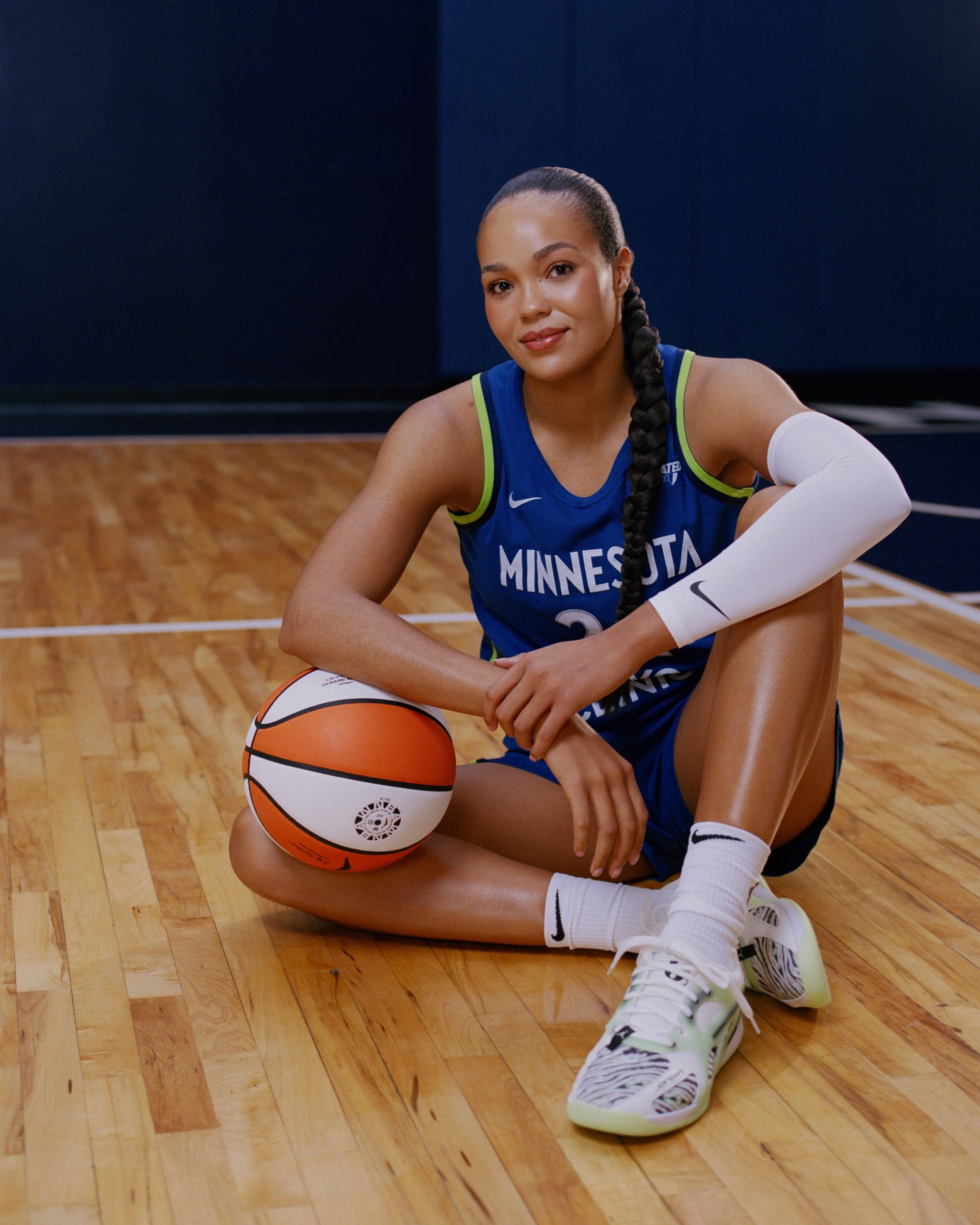
Napheesa Collier, the WNBA’s Fiercest Warrior
This profile on Napheesa Collier is part of Glamour’s 2025 Women of the Year package honoring five remarkable WNBA players. See them all here.
The Collier family doesn’t take no for an answer.
When sixth-grade Napheesa Collier wasn’t given the opportunity to try out for her Missouri hometown’s Amateur Athletic Union basketball team because it was “full,” her parents created their own team of girls from neighboring towns called the Lady Warriors. And when Collier was looking for better financial opportunities than the WNBA provided, she did the same thing.
In 2023 her husband and business partner Alex Bazzell sat down with New York Liberty’s Breanna Stewart to discuss an off-season league that would offer higher salaries than the W, equity in the league for inaugural players, and an opportunity to remain in the States between regular seasons. “I was actually overseas at the time, so Alex flew to New York, had dinner with Stewie, kind of laid out the plan, everything involved,” she tells me. “Right away, she’s like, ‘This sounds awesome. This is something I want to be a part of.’ And she came on board.”
After raising $35 million in capital investments and scoring a multiyear media rights deal with TNT, the trio launched the first season of Unrivaled, a Miami-based three-on-three league featuring 36 of the best players in the WNBA in January 2025. Since its inaugural season, Unrivaled has been valued at $340 million and is already expanding its roster and state-of-the-art facilities.
Emmie America
If all of this sounds very fast, Collier initially planned to move even quicker. “Honestly, we were trying to push to launch in 2024, but that was just way too fast,” she said. “I mean, the sport is just exploding. We knew the time was now, and so the faster you can get in and get it off the ground, the better.” In the end, she said, it was the right choice to wait another year and make sure they were able to create the best experience for fans and players.
Perhaps she learned from the last time she pushed herself a bit too fast. Back in 2022, Collier returned to the Minnesota Lynx just six weeks after giving birth to her daughter, Mila, in May, hitting the court for a game after just 11 weeks. “I don’t recommend it. Bad idea,” she tells me with a laugh. “I should have just come to be with the team, but I got back in shape to be able to play.”
Collier stresses that there was no pressure from the team or the league, just her own strong desire to play one more game with her mentor and friend Sylvia Fowles before she retired. In the end, she pushed herself too hard.
“I thought I actually wasn’t going to be able to play in that next WNBA season, because my body was so bad,” she says. “I had to do just rehab the entire off season. It was just so painful. And it turned out I have an autoimmune disease, so that affects my joints.” Add that to all the hormones that come with pregnancy, and Collier says the experience “changed the chemistry of my body” and she was forced to “rebuild.”
She still made the All-WNBA First Team and the WNBA All-Defensive Second Team in 2023. The year after that, she was named defensive player of the year and earned her second Olympic gold medal. Despite missing seven games due to an ankle injury in August, she put out history-making stats and was a front-runner for MVP in 2025. As for popularity, she secured 1,176,020 fan votes for this year’s All-Star game, securing the captain spot opposite Caitlin Clark.
Even given the physical impacts of pregnancy on an athlete, I’m loath to ask women how they “balance it all” when men are rarely asked to reckon with how fatherhood impacts their professional endeavors, but I kind of can’t help myself when speaking to someone with so many accomplishments under their belt at 29 years old.
Of course, the answer is that it’s not as easy as she makes it look, though she grants a lot of credit to her partnership with Bazzell. The pair met when Collier was still in high school before Bazzell became her summer trainer during her first two-years at the University of Connecticut. However, their relationship did not take a romantic turn until her junior year when he began working as a skills coach with the New York Nets.
“I was having a really bad season, so I was like, ‘You’re already in New York, can you come help me work out?’” she tells me. “The drive is, like, three hours, so he would stay for a little bit longer, we would go to dinner. We talked about the season and then we kind of just progressed from there.”
Outside of their marriage, Collier says she and Bazzell have a great family support system. For two basketball seasons, her father lived with them to help care for Mila, but as he prepares for his own upcoming wedding this year, Collier decided it was time for him to “go live your life.” So she took a swing and asked her daughter’s favorite teacher in New Jersey to move to Minnesota and be Mila’s nanny—and she said yes.
“It’s still hard,” says Collier, who constantly “agonizes” over how her and Bazzell’s schedules will affect her daughter. “I mean, she’s getting older now, so it’s like, Should she travel or should she just have a more constant schedule and be home? But that means I’m away from her for like, 10 days at a time on these road trips. So that part is hard.” Needless to say, Collier is certainly excited about playing for Unrivaled, when the whole family will be based in Miami.
And despite how effortless her style of play might look, it’s not. “I’m not the most athletic player, and I’m undersized for my position, but something that I was taught at UConn is that I try to use my abilities to be smarter than other players,” she says. That means reading scout reports and thinking hard about timing and the way she maneuvers her body. “I am smaller than a lot of people, so I have to use my body to get into them before I shoot again, just trying to outsmart instead of out-talent, because I’m not gonna be able to do that.”
I don’t know about that, but it sounds like another example of the strategic instinct she’s employed to push for changes in the WNBA. “You know, everything is so great in Minnesota. We share everything with the men’s team [the Minnesota Timberwolves]. So whatever they have, we have,” Collier says. “After learning that [other teams] don’t even have practice facilities, they don’t even have changing rooms, they don’t have all these things. It just feels really unjust.”
She continues, “I feel like that is not a hard thing for me to fight for because I’m a player in this league too. I want to lift this up for everyone…. I don’t mind that New York takes planes. I’m glad for you guys. But it shouldn’t be unfair [to the point] where [some] people are living in squalor.”
While Collier couldn’t go into specifics about every single thing the Women’s National Basketball Player’s Association was hoping to achieve from the new collective bargaining agreement, she says a walkout is certainly possible if the players don’t get the things they need.
“If we give in, we’re not only doing a disservice to us, we’re doing a disservice to where we have gotten in women’s sports,” she says. “We really have no choice but to stand strong again, not just for the present, but for the future of our league too.”
As Collier tells me ahead of the deadline, “We are standing really firm on what we want, and we’re not going to give in before we get it.”











